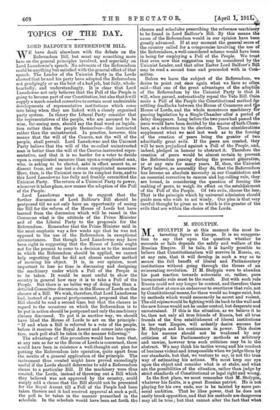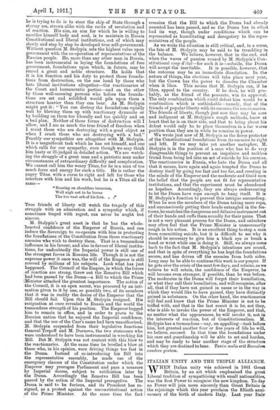M. STOLYPIN.
MSTOLYPIN is at this moment the most in- teresting figure in Europe. It is no exaggera- tion to say that upon the question whether he succeeds or fails depends the safety and welfare of the Russian Empire. If he fails, it is hardly possible to believe that Constitutionalism will survive in Russia, or, at any rate, that it will develop in such a way as to secure the full benefit of liberal and Parliamentary institutions without going through the throes of an eviscerating revolution. If M. Stolypin were to abandon' his post reaction towards autocratic or, rather, pure bureaucratic rule must be the result. But with such rule Russia could not any longer be content, and therefore there must follow at once an endeavour to overthrow that rule, not by Constitutional means, for these would no longer exist, but by methods which would necessarily be secret and violent.. The old regime would be fighting with its back to the wall and the new forces would not be under control, but desperate and unrestrained. If this is the situation, as we believe it to be, then not only all true friends of Russia, but all true friends of the firm establishment of liberal institutions in her vast Empire, will ardently desire success for M. Stolypin and his continuance in power. This desire for his success should not be weakened by any criticism of his Parliamentary methods as arbitrary and unwise, however true such criticism may be in the abstract. We may think his tactics wrong and his conduct of business violent and irresponsible when we judge them by our standards, but that, we venture to say, is not the true way of estimating his actions. We must keep our eye upon the object and consider what is at stake, and what are the possibilities of the situation, rather than judge by strict standards of Constitutional or legal right and wrong.
In the first place, we must remember that M. Stolypin, whatever his faults, is a great Russian patriot. He is not playing for his own ends, nor is he tainted by mere per- sonal ambition. That he likes rower, that he does not' easily brook opposition, and that his methods are dangerous may all be true ; but that cannot alter the fact that what he is trying to do is to steer the ship of State through a stormy sea, strewn alike with the rocks of revolution and of reaction. His aim, an aim for which he is willing to sacrifice himself body and soul, is to maintain in Russia Constitutional and liberal institutions, out of which may slowly and step by step be developed true self-government. Without question M. Stolypin sets the highest value upon government with the co-operation of representatives of the Russian people. He, more than any other man in Russia, has been instrumental in laying the foundations of free government, foundations upon which, in future, may be reared a great and noble structure. He holds that it is his function and his duty to protect those founda- tions from destruction, on the one hand by those who hate liberal institutions altogether—the reactionaries of the Court and bureaucratic parties—and on the other by those well-meaning persons who before the founda- tions are set and solidified would pile upon them a structure heavier than they can bear. As M. Stolypin might put it : " You can destroy the foundations equally well by blowing them up with reactionary dynamite or by building on them too liberally and too quickly and on a bad plan. Neither of these forms of destruction will I allow, and I am as much the true friend of freedom when I resist those who are destroying with a good object as when I crush those who are destroying with a bad." Frankly our sympathies are altogether with M. Stolypin. It is a magnificent task which he has set himself, and one which calls for our sympathy, even though we may think him hasty or ill-judged in detailed action. We are watch- ing the struggle of a great man and a patriotic man under circumstances of extraordinary difficulty and complication. We cannot call him the weary Titan, for he is a man of too much force and energy for such a title. He is rather the angry Titan with a curse to right and left for those who interfere with him and his work, but he is a Titan all the same—
"Bearing on shoulders immense, Well nigh not to be borne The too vast orb of his fate. ,
'True friends of liberty will watch the tragedy of this struggle with an admiration and a sympathy which, if sometimes tinged with regret, can never be aught but sincere.
M. Stolypin's great asset is that he has the whole- Iearted confidence of the Emperor of Russia, and can induce the Sovereign to co-operate with him in protecting the foundations of the Constitution from those reactionary 'enemies who wish to destroy them. That is a tremendous !influence in his favour, and also in favour of liberal institu- tions, for undoubtedly the Imperial power is still one of the strongest forces in Russian life. Though it is not the supreme power it once was, the will of the Emperor is still revered by millions of his subjects. Look what has just happened. The Council of the Empire, in which the forces of reaction are strong, threw out the Zemstvo Bill which had been passed by the Duma—a Bill to which the Prime Minister attached the greatest importance. The action of the Council, it is an open secret, was procured by an inti- mation given to it by one, or possibly two, of its members that it was in reality the desire of the Emperor that the 'Bill should fail. -Upon this M. Stolypin resigned. His resignation at once revealed to Russia and the world the tremendous strength of his position. The Emperor begged him to remain in office, and in order to prove to the Russian nation that he enjoyed the Imperial confidence, and that the use of the Czar's name had been unauthorised, M. Stolypin suspended from their legislative functions General Trepoff and M. Durnovo, the two statesmen who were understood to have been instrumental in wrecking his Bill. But M. Stolypin was not content with this blow to the reactionaries. At the same time he levelled a blow at these who, in his opinion, were driving things too fast in the Duma. Instead of re-introducing his Bill into the representative assembly, he made use of the emergency clauses of the Constitution under which the Emperor may prorogue Parliament and pass a measure by Imperial decree, subject to ratification later by the Duma. Accordingly the Zemstvo Bill has been passed by the action of the Imperial prerogative. The Duma is said to be furious, and its President has re- eigned, as a protest against the unconstitutional action of the Prime Minister. At the same time the fact remains that the Bill to which the Duma had already assented has been passed, and so the Duma has in effect had its way, though under conditions which can be represented as humilitating and derogatory to the repre- sentatives of the people. As we write the situation is still critical, and, in a sense, the fate of M. Stolypin may be said to be trembling in the balance. We believe, however, that in the end, and when the waves of passion roused by M. Stolypin's Con- stitutional coup d'etat—for such it is—subside, the Duma will accept the inevitable. It is possible, however, that the outcome may be an immediate dissolution. In the nature of things, the elections will take place next year, but the Crown has the power to dissolve the Chamber when it likes. This means that M. Stolypin can, if he likes, appeal to the country. If he does, he will pro- bably, as the friend of the peasants, win its approval. The only combination which could defeat him would be a combination which is unthinkable—namely, that of the friends of popular liberty with its enemies the reactionaries. The friends of liberty, though just now they may be sore and indignant at M. Stolypin's rough methods, know at heart that he is on their side, and that to bring about his defeat would only be to place themselves in a far worse position than they are in while he remains in power. We wrote just now of M. Stolypin as the fierce protector of the Constitutional foundations from its enemies to right and left. If we may take yet another metaphor, M. Stolypin is in the position of a man who has to do very disagreeable things to prevent an impulsive and reckless friend from being led into an act of suicide by his enemies. The reactionaries in Russia, who hate the Puma and all that it means, have again and again tempted the Duma to destroy itself by going too fast and too far, and creating in the minds of the Emperor and the moderate and timid men the belief that the people are not fit for representative institutions, and that the experiment must be abandoned as hopeless. Accordingly, they are always endeavouring to let the Duma have rope enough to hang itself. It is M. Stolypin's function to prevent this intrigue succeeding. When he sees the members of the Duma taking more rope, and unconsciously getting their heads entangled in the fes- toons, he snatches the dangerous and delusive instrument out of their hands and cuffs them soundly for their pains. That is not a very pleasant process for the Duma, and onlookers may often feel that the Prime Minister is unnecessarily rough in his action. It is an excellent thing to stop a man from committing suicide, but it is difficult to see why it should be necessary to give him a black eye or break a hand or wrist while one is doing it. Still, we always come back to the fact that M. Stolypin's intentions are sound, and that in spite of everything he has kept the foundations secure, and has driven off the enemies from both sides. Long may he be able to continue this work is our prayer. If he gets over the crisis of the next few days, and retains, as we believe he will retain, the confidence of the Emperor, he will become even stronger, if possible, than he was before. The moderates in the Duma will forget their humiliation, or what they call their humiliation, and will recognise, after all, that if they have not gained in name or in the way in which they would like to have gained, they have distinctly gained in substance. On the other hand, the reactionaries will feel and know that the Prime Minister is not to be trifled with, and that in the last resort it is he, not they, who is able to invoke the power of the Emperor, and that, no matter what the appearances, he will invoke it, not in the interests of reaction, but of Constitutionalism. M. Stolypin has a tremendous—nay, an appalling—task before him, but granted another four or five years of life he will, we believe, succeed. In that time the foundations under his care and guardianship will be able to set and harden, and may be ready to bear another stage of the structure which they are destined to bear. Tang molie exit Borealem condere gentem.











































 Previous page
Previous page